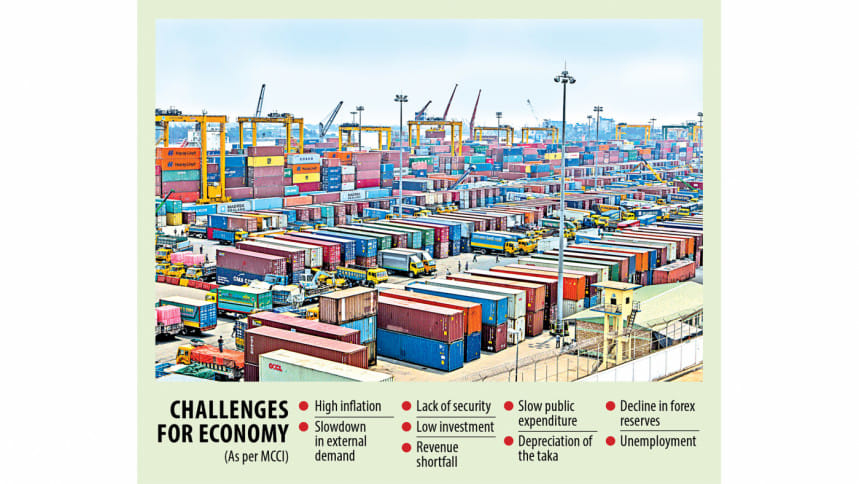Security a must for economic recovery: MCCI

Smooth logistics, banking services and security for industries are a must to ensure a revival of economic activities that have been disrupted following the mass uprising that toppled the previous government.
The Metropolitan Chamber of Commerce and Industry, Dhaka (MCCI), the leading trade body in Bangladesh, made these observations in its publication on the performance of Bangladesh's economy in the fiscal year (FY) 2023-2024, released yesterday.
The chamber said the economy showed some signs of improvement with an increase in foreign exchange reserves and remittances in FY24.
"After the fall of the Awami League government, the interim government had taken over charges and it would take time to normalise business activities," it said.
The trade body said lukewarm global demand, economic turmoil, geopolitical crises and inflationary pressures impacted overall export earnings in FY24
The oldest trade body in the country pointed out challenges such as high inflation, a slowdown in external demand, a shortfall in revenue collection and slow public expenditure. Besides, depreciation of the local currency, taka, fast-depleting foreign exchange reserves, overall unemployment and low investment are the other challenges, it added.
The MCCI's report comes a day after the official data released on Monday showed that Bangladesh's economy grew by 3.91 percent in the April-June period of this year, the lowest in the past five quarters, due to the contractionary monetary and fiscal policies that are being employed to tackle dwindling forex reserves and persistent inflation.
Industrial production grew by 3.98 percent, the smallest gain in the last eight quarters. The agriculture and services sectors also expanded at a slower pace, according to the Bangladesh Bureau of Statistics (BBS).
Using provisional estimates, the MCCI said the gross domestic product (GDP), a measure of the final value of goods and services produced in an economy over a specific period, increased by 1.66 percent in dollar terms to $459 billion in FY24 from $451 billion the previous year.
The MCCI added that the government has taken some measures to address the economic fallout from the political changeover.
"The government also needs to take further actions to stabilise foreign exchange reserves, manage inflation, enhance revenue earnings, ensure adequate electricity and gas supply for economic activities and protect small businesses," it added.
The MCCI said Bangladesh's economy has been experiencing high inflation for nearly two years, even as inflation has subsided globally, with some countries nearing deflation.
"The government and the central bank have taken various steps, including raising the policy rate, liberalising the interest rate regime and introducing a crawling-peg system to curb higher inflation, but these measures did not bear fruit yet. Rather, inflation remains high with every passing month."
The trade body said lukewarm global demand, economic turmoil, geopolitical crises and inflationary pressures impacted overall export earnings in FY24.
It said imports declined in the last fiscal year compared to the previous one, due mainly to a number of initiatives undertaken by the central bank and the government since April 2022 to restrict foreign currency expenditure.
The country also witnessed a decrease in private investment as a percentage of GDP to 23.51 percent in FY24 from 24.18 percent a year ago.
The chamber attributed the low level of private investment, both domestic and foreign, to underdeveloped infrastructure, inadequate energy supply, inconsistent policy and regulatory frameworks, scarcity of industrial land, corruption, and non-transparent and uneven application of rules and regulations.
"The government needs to address these impediments to attract more foreign direct investment to the country in order to ensure speedy development."
Net foreign investment increased by nearly 3 percent year-on-year to $1.6 billion in FY24.
"FDI inflow in Bangladesh is low compared to many other countries at a similar level of development."

 For all latest news, follow The Daily Star's Google News channel.
For all latest news, follow The Daily Star's Google News channel. 








Comments